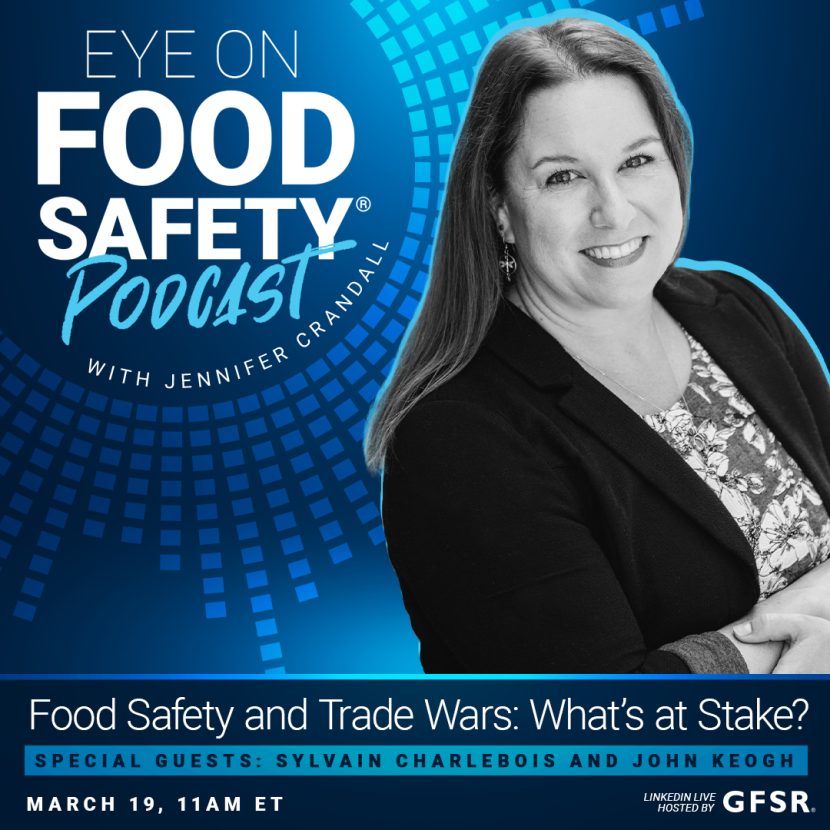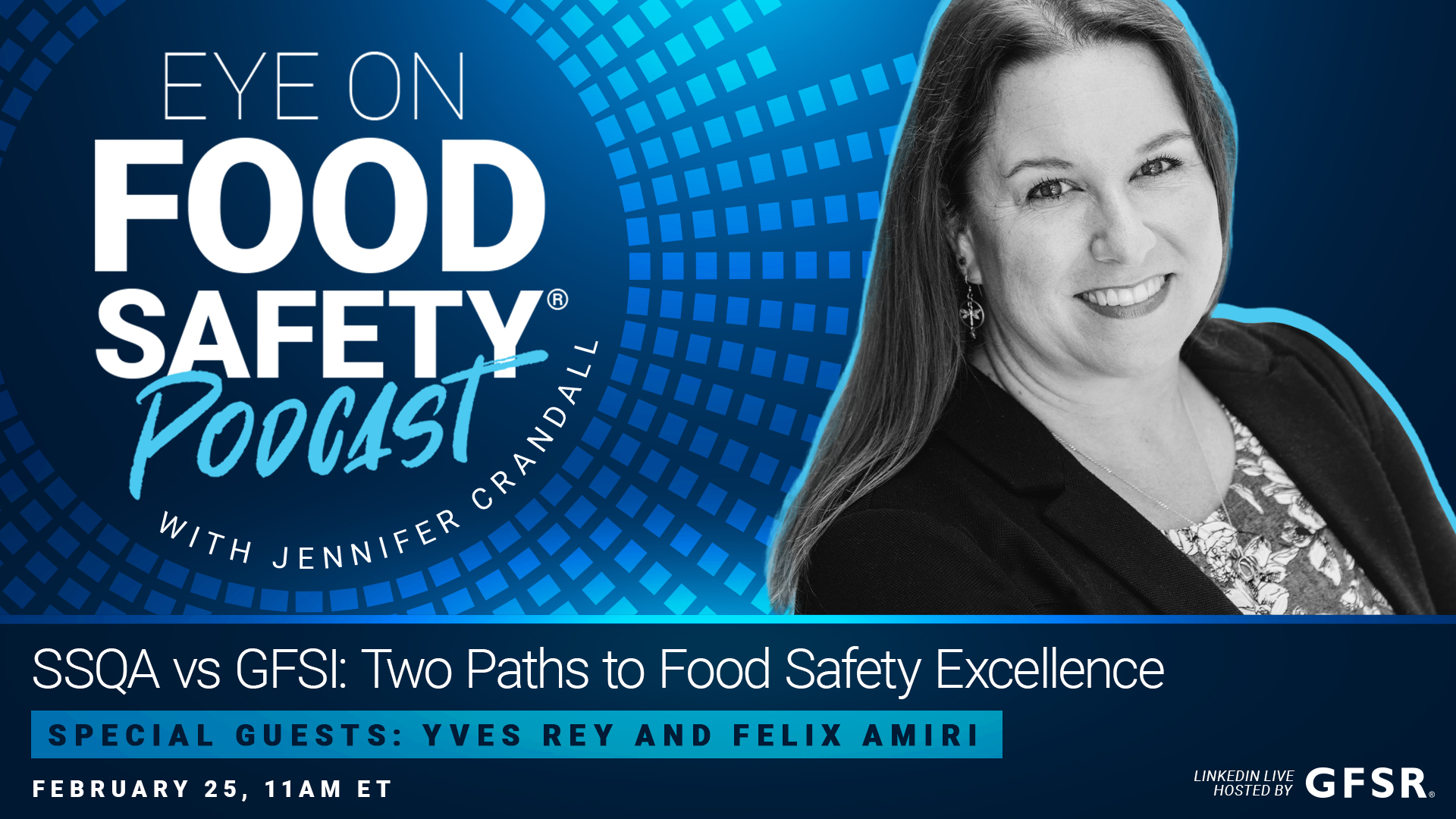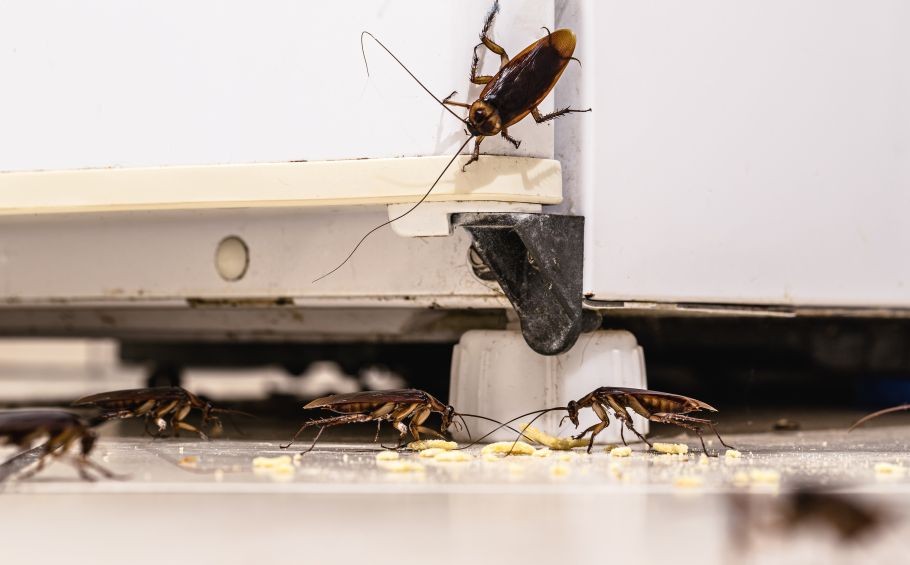Trade Wars, Tariffs, and Transparency: How Global Challenges are Reshaping Food Safety
Transcribed from the Eye on Food Safety Podcast
In an era of unprecedented global uncertainty, food safety professionals are facing complex challenges that extend far beyond traditional risk management. This was the topic of discussion during the March 2025 episode of the Eye on Food Safety Podcast featuring experts John Keogh and Sylvain Charlebois. The conversation revealed the intricate ways trade tensions, technological innovations, and global disruptions are transforming the food supply chain.
The conversation hosted by Global Food Safety Resource and Jennifer Crandall, CEO of Safe Food en Route, dove deep into the multifaceted impacts of trade wars and economic uncertainties on food safety and supply chain resilience. At the heart of the discussion was a critical message: adaptability is no longer optional, it’s essential.
The tariff tango: Economic unpredictability
Sylvain Charlebois, director of the Agri-Food Analytics Lab at Dalhousie University, was direct about tariffs.
“Tariffs are bad for the economy. They’re always bad for the economy. They’re solely bad for consumers, and they’re bad also for policy, because they make things highly unpredictable.”
This unpredictability forces companies to make rapid, sometimes risky decisions. Businesses are now compelled to diversify ingredient sources, explore alternative packaging materials, and develop more robust risk management strategies.
This unpredictability forces companies to make rapid, sometimes risky decisions. Businesses are now compelled to diversify ingredient sources, explore alternative packaging materials, and develop more robust risk management strategies.
The COVID-19 catalyst
The pandemic served as an unexpected catalyst for transformation. John Keogh, professor of Practice at McGill University, noted that the food industry “performed magically and really pulled one out of the hat to try to get food on our plates.”
More importantly, he highlighted a critical insight into food security.
“We never had a food security issue, per se, we had enough food. So, I turned that into a conversation about … food uncertainty.”
This uncertainty exposed significant gaps in supply chain transparency and interoperability, pushing companies to accelerate digital transformation efforts.
“McKinsey (the management consulting firm) came out and said that we did more digital transformation (during COVID). They estimated about 10 years of digital transformation in the first four months … so that was a massive step forward where organizations had no choice but to go online and present their products, and they had issues that they previously didn’t think about,” he said, such as how best to have the same representation of their physical product online.
Technology: The new risk management frontier
Both experts emphasized the transformative potential of technology, particularly artificial intelligence. Charlebois believes AI will revolutionize risk management.
“I think AI is going to make most companies better risk managers. I do believe that, because it’s always actually easier to manage a company when you know where problems are likely to happen in the future,” he said.
However, they also cautioned that technological adoption must be accompanied by transparent communication with consumers who might be skeptical of AI-driven processes.
“The one thing that really is quite interesting is how do you make sure that you continue to manage risk properly without compromising that moral contract you have with consumers?” he asked. “I think a lot of consumers feel very, I would say, a little skeptical about AI in general. They think that AI is really against them… (that) it’s about benefiting companies in general (through surge pricing). That’s one thing that I suspect that companies will have to … (convey) to the public that, well, we’re actually using this to help you, to protect you, the public.”
The human element: Food safety culture
A recurring theme was the importance of food safety culture. Keogh stressed the significance of training workers, especially migrant workers, in their native languages to ensure comprehensive understanding of food safety protocols.
Charlebois added a powerful perspective about celebrating the wins in safe food.
“We need to celebrate our accomplishments a little bit more, and we do it with some data… food has never been as safe as now,” he said.
Practical advice for food safety professionals
Keogh and Charlebois offered several key recommendations for food safety and quality leaders, including the need to:
- Maintain multiple supplier options
- Invest in digital transformation
- Prioritize supply chain transparency
- Continuously educate and train staff
- Leverage data and predictive technologies
Looking ahead: Resilience is key
The conversation concluded with an optimistic message.
“If you survived the last five years with inflation and COVID and everything else, you’re good. You’re doing okay. You’re going to survive whatever’s thrown at you,” Charlebois said.
The food safety landscape is evolving rapidly. Success will belong to those who can adapt quickly, embrace technological innovations, and maintain a robust, flexible approach to risk management. By understanding the broader economic and technological context, food safety professionals can transform challenges into opportunities for growth and innovation.
This conversation, and all the previous episodes of Eye on Food Safety with GFSR, are available for listening on Apple Podcasts and Spotify, and video recordings of the live event can be viewed on demand with a Premium Subscription from GFSR.

-
 FeaturedRisk management
The Cost of a Breach: What a Cyberattack Could Mean for Food Safety Recalls
FeaturedRisk management
The Cost of a Breach: What a Cyberattack Could Mean for Food Safety Recalls
-
 FeaturedRisk management
Securing the Food Chain: How ISO/IEC 27001 Strengthens Cybersecurity
FeaturedRisk management
Securing the Food Chain: How ISO/IEC 27001 Strengthens Cybersecurity
-
 FeaturedRisk management
Revolutionizing Food Safety Training: Breaking Out of the “Check-the-Box” Mentality
FeaturedRisk management
Revolutionizing Food Safety Training: Breaking Out of the “Check-the-Box” Mentality
-
 GFSI Standards
GFSI 2025: Building Trust, Tech-Forward Solutions, and Global Unity in Food Safety
GFSI Standards
GFSI 2025: Building Trust, Tech-Forward Solutions, and Global Unity in Food Safety
-
 FeaturedFood Safety
Integrated Pest Management: Strategies to Protect Your Brand’s Reputation
FeaturedFood Safety
Integrated Pest Management: Strategies to Protect Your Brand’s Reputation
-
 FeaturedFood Safety Culture & Training
No Open Door Policy: Challenges That Impact Pest Control in Food Processing Plants
FeaturedFood Safety Culture & Training
No Open Door Policy: Challenges That Impact Pest Control in Food Processing Plants




